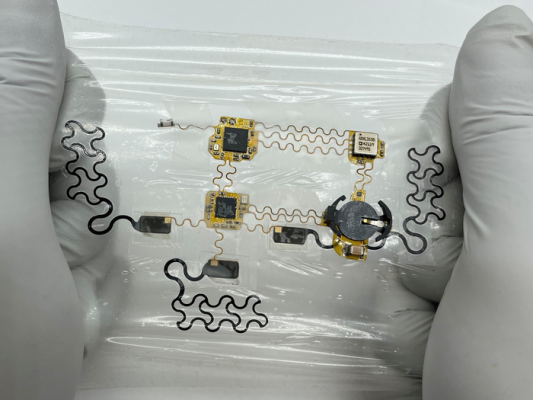
The e-tattoo is stretchy to conform to the body. Image courtesy of The University of Texas at Austin
May 3, 2023 — A new flexible, wearable medical device could provide a major boost in the fight against heart disease, the leading cause of death in the United States.
A team led by researchers at The University of Texas at Austin has developed an ultrathin, lightweight electronic tattoo, or e-tattoo, that attaches to the chest for continuous, mobile heart monitoring outside of a clinical setting. It includes two sensors that together provide a clear picture of heart health, giving clinicians a better chance to catch red flags for heart disease early.
“Most heart conditions are not very obvious. The damage is being done in the background and we don’t even know it,” said Nanshu Lu, a professor in the Department of Aerospace and Engineering Mechanics and a lead author of the study. “If we can have continuous, mobile monitoring at home, then we can do early diagnosis and treatment, and if that can be done, 80% of heart disease can be prevented.”
The study is published in Advanced Electronic Materials.
As a continuation of an earlier chest e-tattoo project, this new version is wireless and mobile, which is enabled by a series of small active circuits and sensors carefully arranged and linked by stretchable interconnections and conforms to the chest via a medical dressing. The clear devices are far less intrusive than other monitoring systems and more comfortable for patients.
Currently, there isn’t a ready solution for long-term, comfortable monitoring outside of the clinical setting. Clinicians can run tests on patients when they visit, but they may not catch some heart issues because signs of disease are not present at that moment.
The e-tattoo weighs only 2.5 grams and runs on a battery the size of a penny. The battery has a life of more than 40 hours and can easily be changed by the user.
It provides two key heart measurements. The electrocardiogram, or ECG, is the electrical signal from the heart. And the seismocardiogram, or SCG, is the acoustic signal from the heart that comes from the heart valves.
ECG can be measured by mobile devices such as an Apple Watch. And the SCG can be monitored via stethoscope. But there is no mobile solution that approximates a stethoscope or takes both measurements.
“Those two measurements, electrical and mechanical, together can provide a much more comprehensive and complete picture of what’s happening with the heart,” Lu said. “There are many more heart characteristics that could be extracted out of the two synchronously measured signals in a noninvasive manner.”
Monitoring those two factors, and synchronizing them, makes it possible to measure cardiac time intervals, which are a major indicator of heart disease and other problems.
The researchers have already tested the device on five healthy patients in their day-to-day environments, with a low error rate in measurements compared with currently available monitoring options. The next step involves further testing and validating the initial results and expanding to different types of patients.
This project rose out of a multi-university partnership of researchers who were awarded a grant in 2021 from the National Science Foundation’s ASCENT program to study chest e-tattoo technology. Lu and her team have refined and adapted the e-tattoo technology to measure multiple parts of the body over the years, such as the palm, and different conditions, like pneumonia.
The project team is Sarnab Bhattacharya and Philip Tan of the Chandra Department of Electrical and Computer Engineering; Alec Alden of the Department of Biomedical Engineering; Sangjun Kim of the Walker Department of Mechanical Engineering; Hirofumi Tanaka, Edward Coyle, Jieting Wang and Taha Alhalimi of the College of Education’s Department of Kinesiology and Health Education; Mohammad Nikbakht and Omer Inan of the Georgia Institute of Technology’s School of Electrical and Computer Engineering; Pulin Wang of Austin company Stretch Med Inc.; and Animesh Tandon of Cleveland Clinic Children’s Pediatric Institute.
For more information: www.utexas.edu


 January 05, 2026
January 05, 2026 









